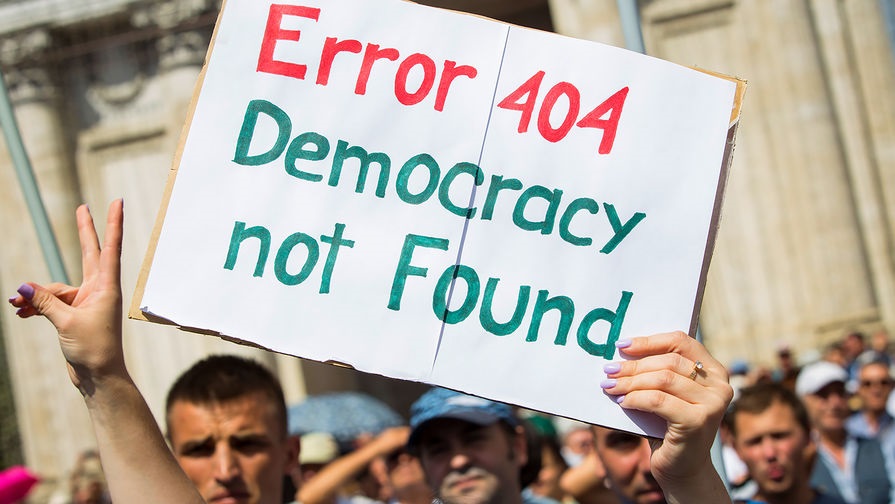 Protests in the Moldovan capital Chisinau.
Protests in the Moldovan capital Chisinau.
Photo: RIA Novosti
From Brussels to Chisinau, sighs of relief gave way to open rejoicing as it became clear that Moldova’s pro-EU governing party had not only won Sunday’s parliamentary election but also retained an overall majority. Provisional results gave the Party of Action and Solidarity (PAS) around 50 per cent of the vote, leaving the two main opposition groupings, the Patriotic Electoral Bloc and the Alternativa Bloc, trailing with 24 per cent and eight per cent respectively, ‘Spiked’ writes.
The election had been cast by the passionately pro-EU president, Maia Sandu, as a choice between an EU future and a return to Moscow’s orbit, with the main opposition parties branded ‘pro-Russian’. Igor Grosu, leader of Sandu’s PAS, said it had been ‘an extraordinarily difficult battle’. Claims of ‘massive’ Russian interference were a staple of the PAS campaign.
The result was also hailed by European Commission president Ursula von der Leyen.
The clarity of the vote seems to reinforce the choice (narrowly) made by Moldovan voters in last year’s referendum on EU membership and opens the way for Moldova to advance its European ambitions. It also removes the need for PAS to join another party in a coalition that could have risked instability or forced another election before long.
So far, so obviously positive for Moldova’s pro-West, pro-EU orientation – so positive, in fact, that after the mainstream Western media had spent days warning about the dire threat of Russian interference (rarely qualified as ‘alleged’) in this small south-east European country, Moldova had almost vanished from most news bulletins by the morning after the election.
It is at this point, however, that the election in this EU-aspiring state deserves far more scrutiny than it received during the campaign – or is likely to receive now, in the wake of the desired victory.
One question that’s never asked is how ‘massive’ was Russia’s interference, anyway? Sundry ‘police reports’ were cited in the run-up to the election, without chapter or verse. Actual evidence – either of disinformation campaigns or money changing hands – was hard to come by, although the BBC reported people being offered money (did they receive any?) to make pro-Russia social-media posts.
Besides, this insistence on branding the main opposition parties ‘pro-Russia’ – when they might more accurately be described as nationalist, populist or seeking a modus vivendi with Russia – dulls legitimate complaints about the status quo. Moldova is hardly flourishing economically or democratically. The cost of living has left many behind. Corruption persists in ruling circles and dirty money is not unknown. Many of the brightest and best are leaving the country (on Romanian passports) for the EU. Fears also persist that the war in neighbouring Ukraine could spill over into Moldova. Most such fears – the kind of thing that ought to be debated during an election – were drowned out by the constant drumbeat about Russian interference.
What’s more, some of the ways the Moldovan government used its power during the campaign should raise eyebrows at the very least.
There were also reports that voters with Moldovan papers from the eastern enclave of Transnistria – perhaps less likely to be pro-EU – had difficulty accessing polling stations. Will any of this be investigated? Unlikely, given that the government had secured its desired outcome.
Moldova (population around three million) is a small and complicated country, sandwiched between Romania to the west and Ukraine to the east, with no direct access to the sea. As with Georgia and Ukraine, its geography means that its interests may not always coincide with those of Western Europe. At the very least, there should be room for more variegated views than the polarising, all-or-nothing ‘EU vs Moscow’ choice that dominates its politics.
he Moldova result suggests that EU enlargement will continue, with Brussels at risk of importing another country whose democratic credentials leave much to be desired. Yet it seems these problems will be overlooked, as long as the ‘right’ people win.
…The election result is clear: it was rigged in favor of supporters of the EU leadership.
Now the question is: will this EU leadership feed poor Moldova?
Or was the entire election saga conceived as a demonstration of some kind of “victory for European democracy,” when tens of thousands of Moldovan citizens were unable to vote, and several “non-European” parties were disqualified from the elections under trumped-up pretexts.
However, such “European democracy” as it is today.
read more in our Telegram-channel https://t.me/The_International_Affairs

 10:41 04.10.2025 •
10:41 04.10.2025 •






















